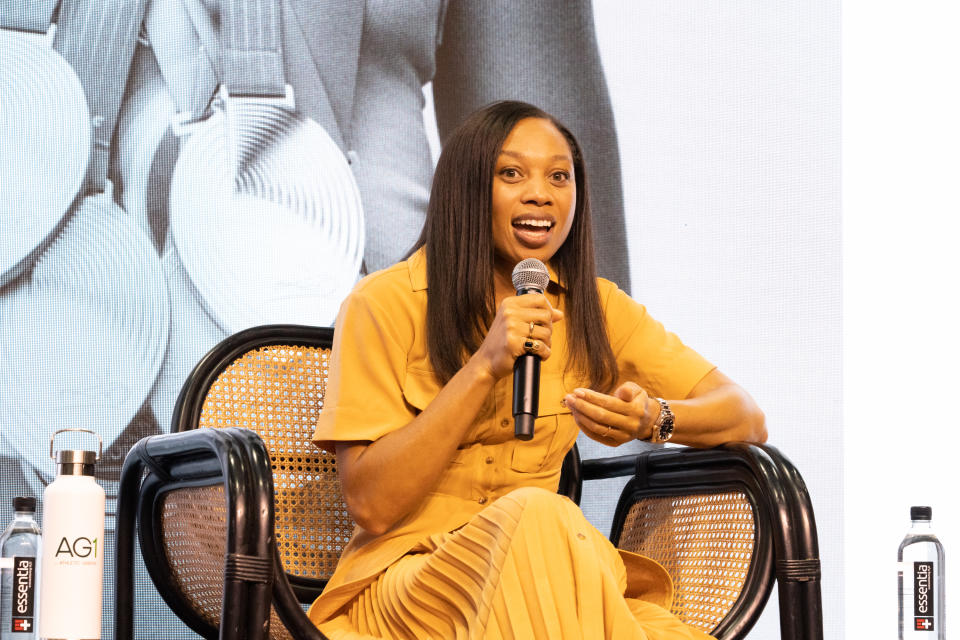SXSW The Wear House: Allyson Felix, Ty Haney and Wes Felix Make ‘Mountaintop’ Moments at SXSW

Siblings Allyson Felix and Wes Felix turned the Fairchild Media Group The Wear House stage at SXSW into a live podcast studio.
The Olympic champion, who cofounded women’s shoe and accessory brand Saysh with her brother, was joined by Ty Haney, chief executive officer and founder of Try Your Best and Joggy Energy (and previously Outdoor Voices).
More from WWD
Athleticism, gender equity and the outdoors were the theme — the Felixes’ podcast is aptly named “Mountaintop Conversations.” As Wes explained, it was Michelle Obama who first introduced the concept of “mountaintop” moments, wherein leaders who surmount challenges to reach a pinnacle peak or mountaintop are responsible to extend their hand to bring others up.
There is plenty cause to do so. Only 2 percent of funding went to female founders in 2022, per PitchBook data, and even less than that, or 0.5 percent, went to women of color.
Haney said Outdoor Voices — a brand that popularized the exercise dress — was “taking a big swing” in opposition to male-founded athletic brands whose goal is to “get to the finish line first,” in her words. “We built this community around doing things, prioritizing the fun of activity with friends out there on the trail, etc. That said, many years later, that positioning became a target…With the takedowns of the world, I’ve realized that challenges have not been normalized in a start-up and have been unfairly put on female founders as the ‘face.’”
“It’s hard but, I still believe it’s the biggest opportunity to be a female founder,” said Haney. “Forgiveness is the power move, and what I’ve learned in the past eight years that I can apply in the next venture: Being the CEO means full accountability regardless of the dynamic.”
Haney’s latest company Try Your Best, or TYB, allows brands to directly connect with fans on the blockchain incentivizing through perks, dollars and more, while Joggy is a “joyful, euphoric, clean energy product,” meant to be akin to a runner’s high.
She’s broadening her take on entrepreneurship. “Yes, it’s about the purpose and the vision and creating an emotional connection, but we also need to make money,” said Haney.

Those challenges are not felt in isolation. Allyson Felix founded Saysh after she was left without a footwear sponsor due to disagreements with then-sponsor Nike over maternity policy. “In pitching to a lot of men, and being met with this idea of, ‘OK, great — I’ll take your shoes to my 13-year-old daughter and let her try them on and get her feedback.’ It’s like, ‘Do you not have any women on your team?’”
Persevering through that discomfort is a skill the Olympian knows well and one that transfers to the boardroom. “I do think my background as an athlete has helped…because what I do know how to do is put my head down and grind.”
Felix said Saysh’s purpose is “finding new ways to push the industry and say, ‘women deserve better.’” For one, the brand offers a maternity returns policy if a woman’s foot changes size due to pregnancy.
But Felix didn’t set out to be a founder. “For me, I wake up and do it because it needs to exist in this world, and we haven’t had it before.”
Through discussing their respective journeys, one note was clear: founders like Felix and Haney are focused on the broader benefits their companies provide women.
As for the mountaintop moments?
For Haney, it was a hand-written note after a customer wore OV’s exercise dress to finish a marathon. For Allyson Felix, it was her comeback to the Olympics in Saysh shoes for the purpose of being a representation to women everywhere. For Wes Felix, it was when Nike changed its pregnancy policy for all of its female athletes going forward.
Wes wrapped the conversation. “That’s what’s fascinating about mountaintop moments — they’re rarely about you.”
Best of WWD